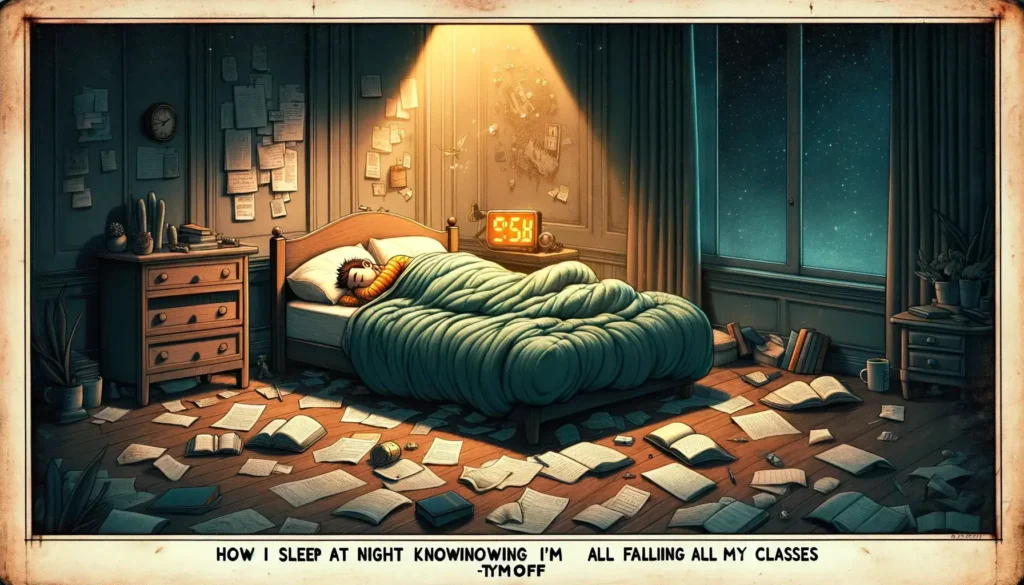how i sleep at night knowing l’m failing all my cl – tymoff: When you fail a class, it feels bad. It’s not just about the grades. It hits you hard, making you doubt yourself. It’s important to talk about this because failing can affect your mind and your future in school.
We need to look after our mental health as much as learning from our mistakes. This is about getting back on track and feeling okay again. Failing isn’t the end. It’s a chance to learn and do better.
We’ll share ways to deal with the stress and steps to improve your grades. Remember, it’s okay to ask for help, whether it’s for your mind or your studies. Taking care of yourself and finding the right way to study can make a big difference.
Let’s tackle this together, focusing on feeling better and getting better grades.

Understanding Failing Grades: It’s Not the End
Failing grades feel like a big deal because, well, they are. But they’re not the end of your academic journey. It’s important to acknowledge that everyone faces setbacks.
The key is to learn from them. If your grades are low, take it as a sign to seek help, change your study habits, or adjust your course load. Remember, academic support services are there for a reason. Use them.
How to Stop Worrying About Failing Grades
Worrying won’t fix your grades, but taking action will. First, identify why you’re struggling. Is it the course material, lack of study time, or maybe poor study techniques?
Once you know the problem, you can work on a solution. Meet with your teacher, find a tutor, or join study groups. And remember, it’s okay to ask for help.
Read Also: A True Relationship is Two Imperfect People Refusi – Tymoff 2024
What Happens If You Fail a Class?
Failing a class isn’t great, but it’s not the end of the world. You might need to retake the class or find an alternative to make up the credits. Talk to your academic advisor and seek support about your options. They can help you figure out the best way to get back on track. Sometimes, a redo is just what you need to master the material and overcome academic obstacles.

Psychological Effects of Academic Failure
Failing a class can make you feel really bad. You might start thinking you’re not smart enough or good enough. This feeling is tough and can lead to more stress and worry.
Being stressed all the time is hard to study or focus on your work. This can make things worse, leading to more academic challenges making it a cycle that’s hard to break.
Stress and Anxiety Due to Academic Challenges
Stress and anxiety don’t just make you feel bad; they can also mess with your ability to do well in school. When you’re stressed, your mind is everywhere but on your books. Anxiety can make you freeze up during tests or forget what you studied. It’s like your mind feels overwhelmed to hold onto the information you need for school.
Understanding how failing affects you mentally and how stress and anxiety play a role in your performance is important. It shows why taking care of your mind is as crucial as studying for a test. When you’re less stressed, you can think clearer and do better in your classes. This is key to getting past failure and improving your grades.

Strategies for Coping: How i sleep at night knowing l’m failing all my cl – tymoff
Mental Health Awareness
Knowing about mental health is key, especially when school gets tough. Feeling bad after failing is normal, but it shouldn’t take over your life. Understanding that it’s okay to feel stressed but important to deal with these feelings is the first step.
Stress Management Techniques
Managing stress can help. Simple things like taking deep breaths, going for a walk, or listening to your favorite music can offer solace and make a big difference among students.
Stress can even disrupt your sleep schedule so, setting a regular sleep schedule and eating healthy food help your brain work better. These steps can lower your stress and make studying easier.
Relaxation Methods
Finding ways to relax is just as important. Activities like yoga, meditation, or even just reading a book for fun can calm your mind. It’s about finding what makes you feel peaceful and doing it regularly.
Seeking Professional Help
Sometimes, talking to a counselor or therapist is the best move. They can offer new ways to think about problems and teach coping strategies. Schools often have counselors, or you can find a therapist outside of school. It’s a sign of strength to ask for help when you need it.
Taking care of your mental health, learning to manage stress, and knowing when to seek help are all important. These steps can make a big difference in how you feel about school and life.
The Importance of Relaxation and Self-Care
Taking care of your mind and body is crucial, especially when you’re stressed. Practicing relaxation techniques, getting adequate sleep cycles, and finding time for activities you enjoy can make a huge difference in how you feel and perform academically. Remember, self-care is not selfish and is crucial for those who are restless among students.

How to Practice Self-Compassion During Tough Times
Be kind to yourself. Acknowledge your efforts and progress, even if it’s slow. Practicing positive self-talk and reminding yourself of your strengths can help build resilience. And when things get really tough, professional help from a counselor or therapist can be invaluable.
Navigating Academic Challenges: Practical Tips
Evaluating What Went Wrong
First, look at why you failed. Was it your study habits or something else outside school? Understanding this can help you fix the issue.
Setting Realistic Goals
Next, set clear goals for what you want to achieve in your studies. These goals should be something you can reach. Then, make a plan on how you’ll study. This means deciding when and what you’ll study each day.
Using Academic Resources
Lastly, use the help your school offers. This could be tutoring, meeting with teachers during office hours, or joining study groups. These resources can give you the extra push you need and help prioritize your learning.
Doing these steps can help you get back on track with your studies. It’s about making a plan and using the help around you.

Maintaining a Healthy Routine
Sleep, Nutrition, and Physical Activity
Getting enough sleep is key. It helps your brain work better. Eating well is also important. Foods that are good for you can make you feel better and study better. Don’t forget to move around. Exercise can lower your stress and make you feel good.
A Balanced Schedule
Make a plan that fits everything. Include time for studying, but also for fun and rest. This balance helps you not get too stressed and keeps you happy. It’s important to enjoy hobbies and relax. This way, you can do well in school and also enjoy life.
FAQs
How can I improve my study habits after failing a class?
Start by figuring out what didn’t work before. Try studying at different times or in different places to see what helps you focus. Break your study time into smaller, manageable parts and use tools like flashcards or study apps.
What are some effective stress-relief techniques for students?
Exercise, meditation, and deep breathing can all lower stress. Also, talking to friends, family, or a counselor helps. Don’t forget to take breaks and do things you enjoy.
How do I talk to my parents/teachers about failing classes?
Be honest and direct. Share what you think went wrong and what you plan to do differently as a proactive step to improve. Ask for their advice and support.
Can failing a class affect my future career or academic opportunities?
It can, but it’s not the end of the world. Use it as a learning experience. Improve your grades moving forward, and explore ways to demonstrate your skills and strengths in other areas.
Conclusion
So how i sleep at night knowing l’m failing all my cl – tymoff suggests Failing a class is tough, but it’s not the final word on your abilities or your future. By understanding the impact, coping with the stress, taking practical steps for recovery, maintaining a healthy routine, and answering your biggest questions, you can move past this setback. Remember, it’s all about learning from the experience, seeking help when needed, and keeping a balance in your life. Stay focused, stay motivated, and keep pushing forward. There’s always a way to bounce back and achieve your goals.

